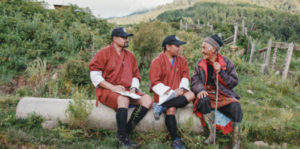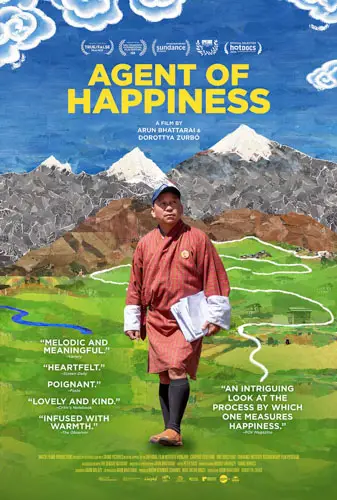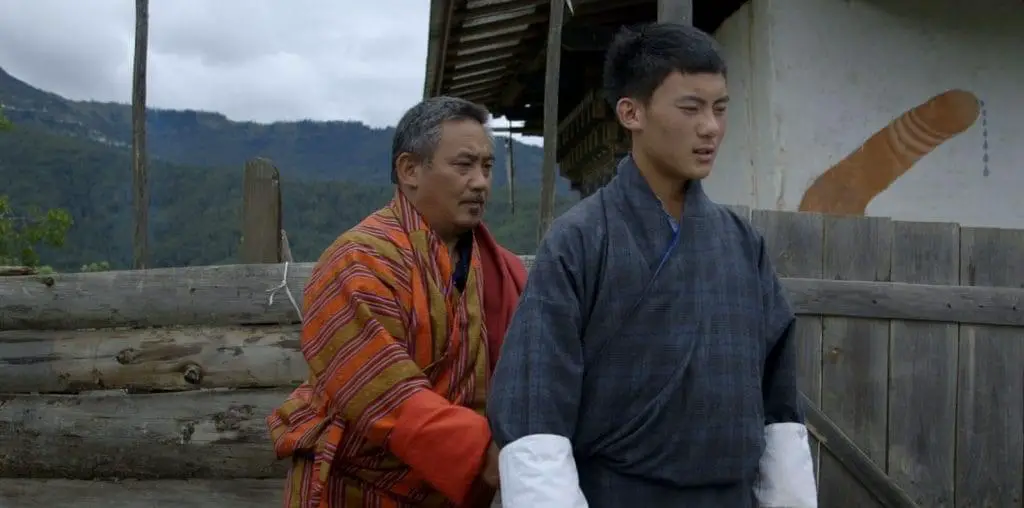
In the documentary Agent of Happiness, Amber Kumar Gurung plays the agent, traveling the mountains of the Bhutanese Himalayas conducting government-sponsored surveys of happiness. Ironically, while scoring the happiness of other citizens, his own fulfillment is dubious, as his life is not what he’d like it to be. We follow Amber as he dutifully attends courses training him for the job, as he ascends to mountain villages to assess happiness by counts of goats and tractors. Some men count cows, while others enumerate wives. One woman is delirious because her cow had a calf.
Co-directors Arun Bhattarai and Dorottya Zurbó allow the viewer a rare glimpse into lives in Bhutan and the peculiar practice of rating for happiness. The Gross National Happiness Index is calculated from individual scores that are rated on a scale of one to ten. The survey contains 148 questions that run the gamut from “How would you rate your knowledge and understanding of local legends and folktales?” to “Do you agree that nature is the domain of spirits and deities?”
The mountains are beautiful, and the people are open and warm. Life in this part of Bhutan is pastoral and peaceful. Agent of Happiness does not rush. Lingering moments of these remote lives allow us to let it sink in. One woman says, “I must have done something good in my past life to be born in this country.” Amber says his job is good, and he’s happy to have a car, but without a wife to share his life with, it’s all pointless. His own personal happiness index is low.

“…the agent conducts government sponsored surveys of happiness…”
In other, more urban parts of the country, Amber finds himself in the absurd position of asking a Transgender burlesque dancer if she owns a tractor. She does not. He meets people who love city life for its energy and conveniences. Bhutan has unique challenges, but people deal with them as people do everywhere. Money doesn’t guarantee happiness, and poverty doesn’t always mean misery. The three wives of the man boasting they are all happy look like they would be less glum if they rolled him off a cliff. They are clearly sad and frustrated on camera while they verbally agree that everything is joyous. They later say that they consider each other as sisters, and those relationships do make them happy.
As Agent of Happiness wears on, we learn that Amber’s family had their citizenship revoked in ethnic troubles when he was a toddler. He is struggling to regain citizenship, and this is hampering his attempts to meet a woman and marry. He frets over a new application his friend is helping him with. When he begins seeing a woman named Sarita, his prospects improve. We find ourselves rooting for Amber and his desire for a wife and family.
Ostensibly, the film is about how the happiness index is arrived at and how the government will use it. However, following the survey is really just a way to get a detailed look at Bhutanese life at the ground level. From an outside perspective, the GNH is seen as a propaganda tool used by the Bhutanese government to distract from ethnic cleansing and human rights abuses it has committed.
In Agent of Happiness, Bhattarai and Zurbó have gifted us with a charming, heartfelt moment spent with the people of Bhutan, where, despite the efforts of the government, happiness can’t be quantified. As with people everywhere, it comes in brief, golden moments of connection with others who brighten their lives and give them meaning.

"…charming, heartfelt..."


